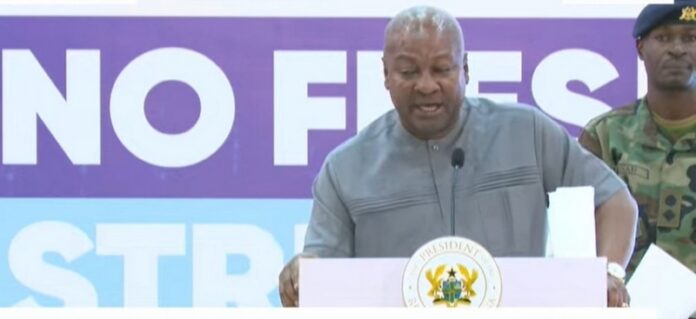Ghana’s President, John Mahama, has attributed the country’s remarkable economic rebound to bold reforms, commodity-driven growth, and improved fiscal discipline.
He has, however, warned that this moment of prosperity must be used wisely to avoid a return to old traps.
In a wide-ranging interview with The Africa Report, Mahama credited Ghana’s surging gold and cocoa exports, up 76% and 300% respectively in early 2025, for lifting the cedi, easing inflation, and improving investor sentiment.
“When the world becomes unpredictable, people head to gold,” Mahama said, positioning Ghana as Africa’s top gold exporter once again.
The economic recovery, however, is more than luck, he argues. Since assuming office in January 2025 after his electoral comeback, Mahama has pushed through tough reforms: amending the Public Procurement Act, cutting waste, and implementing one of Ghana’s strictest budgets.
“We’ll meet all the IMF benchmarks,” he pledged, while cautioning that “fiscal discipline is necessary for us to create a more resilient economy.”
Gold rush or golden trap?
Mahama rejects concerns that Ghana is slipping back into a colonial-style extractive model.
Instead, he frames the gold boom as an opportunity to “build buffers” and industrialise strategically, not through politically-driven projects like “One District, One Factory,” but by supporting real private-sector processing zones.
However, not all is glittering gold.
Reports of massive gold smuggling, including over 220 tonnes reportedly trafficked to the UAE, continue to cast a shadow on Ghana’s mining industry integrity. “It’s a notorious fact,” a Minerals Commission official admitted to Swiss NGO Swissaid.
Building a 24-hour economy and a new city
Mahama’s industrial vision includes creating a 24-hour economy through targeted agricultural investments.
Plans are underway to cultivate 200,000 hectares of oil palm, reduce food imports, and increase exports to Nigeria.
He also revealed an ambitious Volta Lake economic zone project, combining agriculture, processing hubs, and rail transport to the Tema Port.
Even more audacious is his proposal to establish a new administrative city on the Accra Plains, straddling the Eastern and Volta regions.
“We’ll move some ministries and financial institutions there,” he said, signaling a decentralization effort akin to Nigeria’s Abuja experiment.
Politics, Judiciary, and Sahel Diplomacy
On governance, Mahama reiterated his commitment to constitutional reform, consolidating recommendations from past presidents Atta Mills and Akufo-Addo.
Though facing criticism for suspending Ghana’s Chief Justice, he insists due process is being followed: “Every arm of government has its processes… including impeachment.”
Regionally, Mahama is advocating a thaw between ECOWAS and the Alliance of Sahel States (AoSS), stressing that terrorism, not transition timelines, should be the priority.
“The more you push them on civilian rule, the more they resist,” he warned.
A cautious optimism
As Ghana eyes long-term transformation, Mahama urges Ghanaians to temper the current economic optimism with realism.
“If you’re a good surfer and a good wave comes, you ride it,” he said. “But you also prepare for the next storm.”


